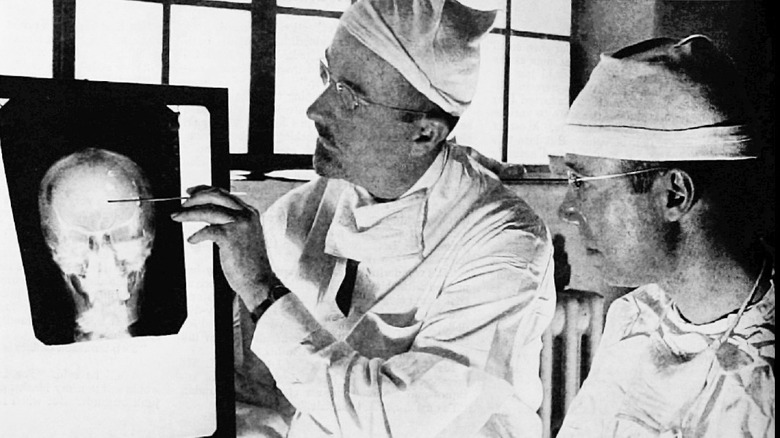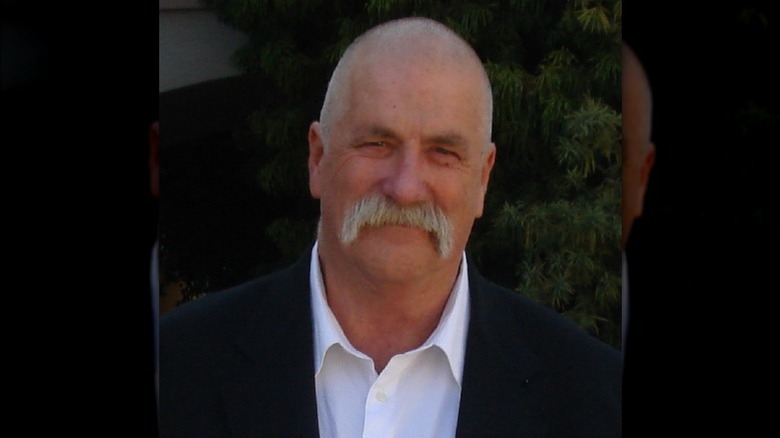Howard Dully Got A Lobotomy When He Was 12 Years Old And Has Spent His Life Telling The Story
We may receive a commission on purchases made from links.
Lobotomy is a surgical procedure done on the brain once believed to cure mental illnesses and personality disorders. It was invented by a Portuguese neurologist, Egas Moniz, in 1935, although he called the surgery a "leucotomy." American neurologist Walter Freeman modified the method and named it lobotomy, and the first procedure was done in the U.S. in 1936, as reported by Psych Central. Dr. Freeman's procedure, which was deemed less invasive at that time, involved using an ice pick to reach the brain through the patient's eye socket. It was called the transorbital lobotomy.
Dr. Freeman conducted lobotomies on about 2,500 patients throughout his career. However, the procedure didn't treat the patients' mental conditions. Instead, removing part of the brain only improved the symptoms and made patients calm and euphoric. According to Medical News Today, the results varied. Some were able to go back to their regular lives, while others spent the rest of their lives dealing with the long-term effects of lobotomy, some of which include headaches, seizures, and dementia. Some patients got worse after the procedure, and others died or were left in a vegetative state. One of Dr. Freeman's patients was a 12-year-old boy named Howard Dully, who, as an adult, went on a journey to find out why he was subjected to a lobotomy.
Howard Dully's background
Howard Dully was born on November 30, 1948. His mother died of cancer when he was 4 years old, and his father remarried a woman named Lou. When Dully was 11 years old, his parents brought him for a consultation with Dr. Walter Freeman. As reported by Damn Interesting, his stepmother described him as "unbelievably defiant" Admittedly, Dully said that he often misbehaved and was a troublemaker. Still, his behavior wasn't drastically different from some of the boys his age. He said her stepmother was strict and treated him differently than his siblings. Prior to visiting Dr. Freeman, Dully's parents consulted with six psychiatrists about his behavior, and they all agreed that there was nothing wrong with him.
When he was brought to Dr. Freeman, however, he diagnosed him with schizophrenia and suggested that the boy undergo a lobotomy to alter his behavior. Dully recalled how his first meeting with Dr. Freeman went, per The Guardian. "He was warm, personable and easy to get along with. Was I fearful? No. I had no idea what he was going to do with me," he stated. The lobotomy took place a couple of months after that meeting. He remembered being wheeled into an operating room on December 15, 1960, just a few days after his 12th birthday. The last thing he remembers was being subjected to electric shocks to sedate him. When he became conscious the following day, he felt a severe headache and his eyes were bruised and swollen. "I was like a zombie; I had no awareness of what Freeman had done," he said.
Howard Dully's search for answers
Decades later in 2003, a production company contacted Howard Dully regarding an idea to make a documentary about his lobotomy. Prior to that, he never confronted his father and stepmother about the procedure Dr. Freeman (pictured left) did, and it was the first time he read his medical files and saw photos. His stepmother died in 2001, but his father was still alive. Dully asked his father why they agreed for him to have a lobotomy, and his father stated that he was threatened with divorce if he didn't agree to it. (via The Guardian). "You meet a guy once and you're going to let him drive spikes in your son's head?" he asked his father. Dully understood that his father didn't have bad intentions, but he was manipulated by his stepmother.
After the lobotomy, Dully spent time in juvenile centers and mental facilities. He took drugs, drank heavily, and used his disability checks to support his vices. "I think I was angry at society for a long time," he said, looking back. He eventually got his life back on track, earned a degree, married, and had children, as noted by The New York Times. Dully was fortunate not to have severe long-term effects from the procedure, but he often gets eye infections due to his tear ducts getting damaged from the lobotomy.
Howard Dully shares his story
In 2007, Howard Dully published a biography co-authored by Charles Fleming titled "My Lobotomy: A Memoir." In it, Dully shares the story of his lobotomy, his background, and his journey to finding out more about the procedure. He shares his conversations with other lobotomy patients and their families, with one of Dr. Freeman's sons, and how he confronted his father. For about four decades, Dully didn't openly talk about his lobotomy, and despite not getting the answers he was looking for from his father, he said that just talking about what happened was much appreciated. "Although he refuses to take any responsibility, just sitting here with my dad and getting to ask him about my lobotomy is the happiest moment of my life," he said, per NPR.
The number of lobotomies performed started to decline in the 1950s to the 1960s with the development of antipsychotic medications. According to Healthline, the last recorded lobotomy performed by Dr. Freeman was done in 1967, which resulted in a brain hemorrhage that led to the patient's death. Several countries have since banned the procedure and although still legal in the U.S. today, it is very rarely performed.



